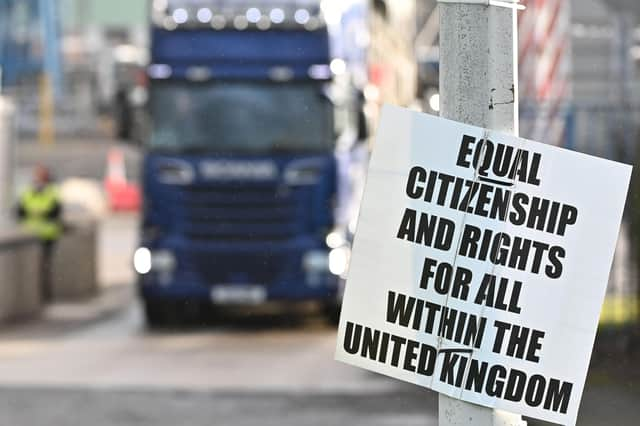Northern Ireland Protocol: News Letter reporter challenges anonymity for Sinn Fein member in Irish Sea border case


The agriculture minister Edwin Poots issued an order to suspend the checks on February 2, but it was challenged just two days later in court by two people: a man called Edward Rooney, and another individual, who is a member of Sinn Fein.
High Court judge Mr Justice Colton suspended Mr Poots’ order, saying that until the case is fully heard checks should continue at the Province’s ports.
Advertisement
Hide AdAdvertisement
Hide AdThe News Letter (via this reporter) questioned why the second individual had been granted anonymity, considering the huge political significance of the court case.
At the time when the anonymity order was approved, the lawyer acting for the anonymous applicant had noted that the case was a controversial one, and that loyalist street violence fuelled by anger over the Protocol had previously taken place.
As part of the appeal for their client’s identity to be hidden, they had argued that “high profile unionist politicians and representatives have used language such as using ‘guerrilla warfare’ against the Protocol, and have referred to the fact that whilst it was a last resort, violence was not off the table”.
This reporter noted that the phrase “guerilla warfare” had been used once by DUP MP Sammy Wilson in an article in the Irish Times last year, and put it to the court that the “reliance on a single iteration of the phrase ‘guerilla warfare’ in a plainly allegorical context” is hardly the same as politicians actually advocating a physical war.
Advertisement
Hide AdAdvertisement
Hide AdIt was acknowledged that there are no specific current threats to the anonymous applicant, although the court was told he had faced threats in the past.
This reporter argued that if courts were to grant anonymity to people who bring legal challenges on the basis that they generate controversy, then “taking this to its conclusion would mean that the more politically-charged a legal challenge is, the more opacity there should be surrounding those taking the action” – and that this would not be a sensible position.
It was also argued that the anonymous individual would surely have been advised at the outset that they would have no guarantee of anonymity, and that given there is another applicant, there is a question around why the anonymous Sinn Fein man needed to be involved in the case at all – but since they did choose to become involved, their party political ties should “erode the case for anonymity”.
Lastly, it was pointed out that in 2017 the law was changed so that anyone who donated £1,500 or more to a political party would have their name recorded next to the donation.
Advertisement
Hide AdAdvertisement
Hide AdFor decades it had been the case that donors were hidden due to security fears.
Among the vocal advocates of donor transparency had been Sinn Fein.
Conor Murphy had said he wanted the reporting threshold dropped to £500, adding: “The announcement from James Brokenshire about moves to make donations to political parties in the north more transparent do not go far enough.
“Sinn Féin wants to see greater transparency around political donations so the public can have confidence in the political process.”
Advertisement
Hide AdAdvertisement
Hide AdIn conclusion, the News Letter submitted to the court that the same principle of transparency that applies to donations should apply to someone driving a high-profile legal case of possible constitutional significance.
Ronan Lavery QC, representing the applicant, stressed his client brought proceedings as a private citizen, and not on behalf of a political party.
“Of course the principle of open justice applies, and anonymity should be exercised sparingly,” counsel said.
“But you have someone who has previously been the victim of threats, and a background of violence surrounding this particular issue.”
Advertisement
Hide AdAdvertisement
Hide AdFollowing submissions Mr Justice Colton reserved his decision on the reporting restrictions challenge.
It is hoped that a decision will be made within roughly a week.
Outside court, a solicitor for the unidentified applicant, Ciaran O’Hare of McIvor Farrell, stated: “The issues surrounding the protocol continue to be a source of tension within our society and therefore, we are of the view that our client ought to continue to remain anonymous.”
More from this reporter:
Click here: Christopher Stalford death: DUP MLA was a right-wing Christian who nonetheless couldn’t stand Donald Trump
Advertisement
Hide AdAdvertisement
Hide AdClick here: WATCH: Jamie Bryson draws applause as he demands unionist workers ‘down tools’ at NI ports
——— ———
A message from the Editor:
Thank you for reading this story on our website. While I have your attention, I also have an important request to make of you.
Advertisement
Hide AdAdvertisement
Hide AdWith the coronavirus lockdowns having had a major impact on many of our advertisers — and consequently the revenue we receive — we are more reliant than ever on you taking out a digital subscription.
Subscribe to newsletter.co.uk and enjoy unlimited access to the best Northern Ireland and UK news and information online and on our app. With a digital subscription, you can read more than 5 articles, see fewer ads, enjoy faster load times, and get access to exclusive newsletters and content.
Visit
now to sign up.
Our journalism costs money and we rely on advertising, print and digital revenues to help to support them. By supporting us, we are able to support you in providing trusted, fact-checked content for this website.
Ben Lowry, Editor